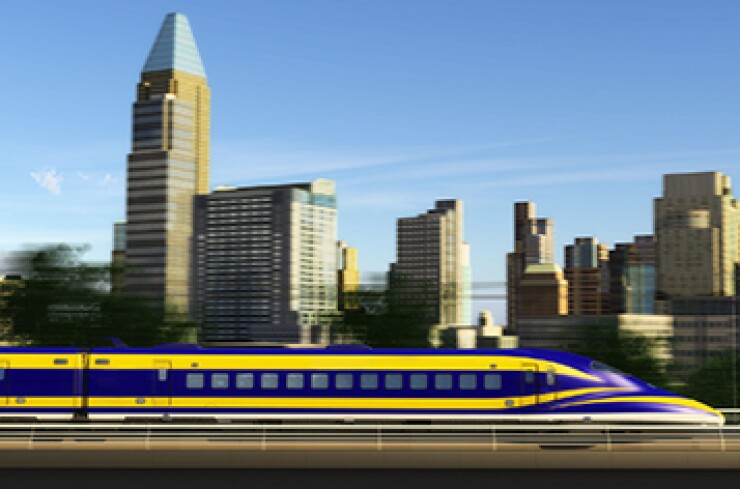
DALLAS -- The chair of a congressional panel looking into California's $64 billion high-speed rail project said it is time for voters to decide whether to rededicate the state bond funding they authorized for it toward alleviating the state's water woes.
Voters thought they were approving a $33 billion project when they created the California High-Speed Rail Authority in 2008 and approved $9 billion of state bonds for the proposed system between Los Angeles and San Francisco, said Rep. Jeff Denham, R-Calif.
The rail project is now expected to cost $64 billion, with no connections to San Diego or Sacramento, said Denham, chairman of the House Transportation & Infrastructure Committee's rail panel and a long-time critic of the HSR project.
"California voters narrowly approved this project's finances in 2008, based on a business case that is radically different than what we see in the CHSRA's plans today," Denham said at Monday's hearing in San Francisco.
"I've been watching the cost of this project go up and up," he said. "If the authority can't provide specific deliverables and a timeframe, then I believe it would be time for Californians to go back to the polls to vote on whether to continue this project."
The Proposition 1 bond referendum was approved by 52.7% of the voters in 2008. The $9.95 billion bond request included $9 billion for the HSR project and $950 million for investments in regional, commuter, and intercity rail.
The California HSR effort has received almost $4 billion of federal funding, including $3 billion from the American Recovery and Reinvestment Act of 2009 and another $929 million in fiscal 2010, Denham said.
"The money allocated to this project was part of the federal stimulus package yet here we are nearly 10 years later with nothing to show for it," he said.
The state government is willing to spend more than $60 billion on a train line as California in the grip of a historical drought that will require the investment of billions of dollars in water infrastructure to resolve, Denham said.
"We have many problems facing California, most notably one of the worst droughts the state has ever seen," he said.
"In a state grappling with a lack of adequate water infrastructure we could have built long-term sustainable water storage for a fraction of the cost [of the HSR line]," Denham said.
There are many shovel-ready water projects that could directly benefit millions of California residents but are not currently funded, he said.
"It's unfortunate that the state and this administration doesn't have the same political commitment to providing a reliable water supply to California as it does to funding a bullet train that has not, is not, and will never deliver on the promises that were made to voters," Denham said.
Work on the HSR project is underway with the latest construction bids coming in under budget, said rail authority chairman Dan Richard.
"We now have a clear path forward for funding the initial operating line from the Silicon Valley to the Central Valley with federal and state public funds already committed to the program," he said at the hearing. "We plan to commence high-speed rail passenger service by 2025."
Bids on three construction contracts came in 25% to 30% less than expected, Richard said.
"All told, the bids for these design-build construction packages have come in approximately $537 million to $1.7 billion lower," he said.
The rail authority will meet the Sept. 30, 2017 deadline for expending the remaining $700 million of funding from the 2009 stimulus act, Richard said.
The state has already spent or signed contracts for almost $1.8 billion of the $2.55 billion stimulus grant, he said.





